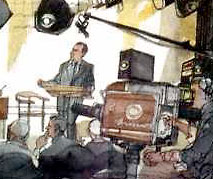Film, Radio and TV
- 30 |
The
Social Impact of Television
Critics blame television for everything from obesity to the murder rate. While TV is easy to criticize, and much of the criticism is justified, we also need to keep in mind that television benefits society in many important ways. In this module we'll start our look at the effects--both good and bad--of this pervasive medium. Just how pervasive? Today, the average American watches close to four hours of TV each day. Based on this, by age 65, the average U.S. citizen will have spent nearly 9, nonstop, 24 hour-a-day years glued to the tube. The following provides even more insight into the power of television--and suggests some sobering things to think about.
|
TV and Children
Although these figures are for U.S. audiences and involve U.S. programming, Canada and most European countries are not too far behind in many of these statistics. It
has been found that most viewers do not turn on television
to watch a specific program. They simply decide to "watch television,"
and then find a program that looks interesting. This is least-objectionable-program
(LOP) model of television viewing we introduced earlier. We also know that most children and adults watch TV in a kind of relaxed, transfixed state of awareness. In the view of some psychologists the fact that people aren't critically thinking about what they are seeing while in this state means that situations (and commercials) are passively accepted on somewhat of an unconscious level. Some go so far as to say that because of this, TV has a kind of hypnotic influence.
We like to be entertained. We like excitement. We like to see handsome men and sexy women. We like to vicariously (and safely) experience the experiences of other people. We like to be drawn into fantasy worlds that we will probably never be able to experience first hand. But, maybe most of all, we like to passively relax in front of "the tube," select our vicarious experiences, and let them flood over us without any real effort on our part. What's wrong with that? Nothing, in moderation. In fact, to stay mentally and physically healthy, it's important to spend some time relaxing each day. Plus, it's been proven that it's healthy to laugh and release our tensions. With TV we can enjoy the humorous escapades of our TV friends. And then there's the information we gain from TV. We first realized the impact of TV during the mid-1900s. U.S. citizens had been reading about the civil rights struggle for decades. But, it was only when TV came along in the 50s and 60s and viewers saw in TV news footage what was really happening, that the country amassed political pressure to take action to change things. U.S. citizens had also read about war for decades. But when they started seeing newsreel footage of dead, maimed, and wounded American soldiers every night on TV as a result of the Vietnam war, the majority of the country soon tuned against the war. All these things had been reported in great detail in newspapers for decades; but reading about them was one thing, seeing them was another. Before television, children had no idea what most foreign countries or their peoples looked like, or how they lived. Most exotic animals and fish were only names in books. Letters, numbers, and words were things that you started learning when you got to first grade. However, because of television, most children are now familiar with these things even before they start school.
Of course, in countries like the United States where most TV relies on commercials to exist, viewers pay a price for their "free TV." One price is the added cost of goods and services that goes toward paying for the commercials--hundreds of millions of dollars a year, in fact. But there may be other "costs." Critics say that commercials make us materialistic and suggest that happiness and well-being revolve around material possessions. Commercials often pair happiness with products we need to buy. Examples they give are the simplistic scenarios we often see in commercials. If your husband is not paying enough attention to you, possibly you should change brands of coffee. If you have a disappointing love life you can solve the problem by buying a new brand of toothpaste, a new breath mint, or a new brand of jeans. Although you may laugh and assume that these commercial messages don't affect you, advertisers know they do. They don't pay a million-dollars a minute for a commercial on the remote chance that it might increase sales--they know it will. How many tubes of toothpaste do you have to sell in 30 seconds to pay for that million-dollar commercial? Such is the power of television.
In case you wondered what the illustration was all about at the beginning of this module, the event depicted marked the beginning of some serious research into the effects of television. Of course, people were concerned about the effects of television from "day one," but many people just said that they couldn't be much different from the effects of radio. However, a televised event early in TV's history showed that these two forms of electronic mass media were, in fact, quite different.
Before the debates, most polls showed Kennedy trailing Nixon in popularity. Even with his Boston accent, and Catholic background (both of which some voters objected to) Kennedy moved ahead of Nixon during the debates, and a short time later was elected president. In
the minds of many the debates made the difference. Kennedy came across
as much more at ease and "presidential." Nixon looked fidgety
and ill-at-ease. But the story doesn't end there. The people who only listened to the debates on the radio had the reverse impression. To them Nixon seemed more articulate and more in command of the issues. Fortunately, for Kennedy, most people followed the debates on television. Some people feel that if Nixon had insisted on confining the debates to radio, he would have won the election. After it became apparent what happened, political consultants quickly started studying the elements of a "winning TV image," and social scientists launched numerous studies into how television affects viewers. In the next module we'll look some of these issues in more detail. |
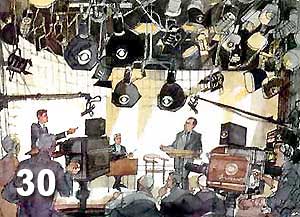
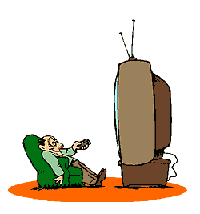 television
set
television
set watch
TV alone and unsupervised
watch
TV alone and unsupervised
 food"
commercials.
food"
commercials.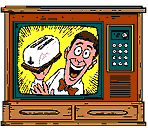
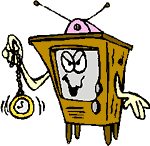
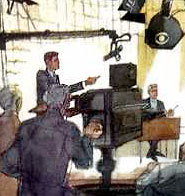 That
event was a debate between the leading candidates for U.S. president
in 1960, Richard M. Nixon and John F. Kennedy.
That
event was a debate between the leading candidates for U.S. president
in 1960, Richard M. Nixon and John F. Kennedy.
